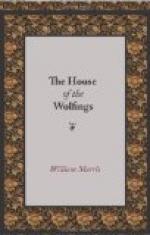“Thou sayest sooth, O daughter: I am no God of might, Yet I am of their race, and I think with their thoughts and see with their sight, And the threat of the doom did I know of, and yet spared not to lie: For I thought that the fate foreboded might touch and pass us by, As the sword that heweth the war-helm and cleaveth a cantle away, And the cunning smith shall mend it and it goeth again to the fray; If my hand might have held for a moment, yea, even against his will, The life of my beloved! But Weird is the master still: And this man’s love of my body and his love of the ancient kin Were matters o’er mighty to deal with and the game withal to win. Woe’s me for the waning of all things, and my hope that needs must fade As the fruitless sun of summer on the waste where nought is made! And now farewell, O daughter, thou mayst not see the kiss Of the hapless and the death-doomed when I have told of this; Yet once again shalt thou see him, though I no more again, Fair with the joy that hopeth and dieth not in vain.”
Then came the Hall-Sun close to her, and knelt down by her, and laid her head upon her knees and wept for love of her mother, who kissed her oft and caressed her; and Thiodolf’s hand strayed, as it were, on to his daughter’s head, and he looked kindly on her, though scarce now as if he knew her. Then she arose when she had kissed her mother once more, and went her ways from that wood-lawn into the woods again, and so to the Folk-mote of her people.
But when those twain were all alone again, the Wood-Sun spoke: “O Thiodolf canst thou hear me and understand?”
“Yea,” he said, “when thou speakest of certain matters, as of our love together, and of our daughter that came of our love.”
“Thiodolf,” she said, “How long shall our love last?”
“As long as our life,” he said.
“And if thou diest to-day, where then shall our love be?” said the Wood-Sun.
He said, “I must now say, I wot not; though time was I had said, It shall abide with the soul of the Wolfing Kindred.”
She said: “And when that soul dieth, and the kindred is no more?”
“Time agone,” quoth he, “I had said, it shall abide with the Kindreds of the Earth; but now again I say, I wot not.”
“Will the Earth hide it,” said she, “when thou diest and art borne to mound?”
“Even so didst thou say when we spake together that other night,” said he; “and now I may say nought against thy word.”
“Art thou happy, O Folk-Wolf?” she said.
“Why dost thou ask me?” said he; “I know not; we were sundered and I longed for thee; thou art here; it is enough.”
“And the people of thy Kindred?” she said, “dost thou not long for them?”
He said; “Didst thou not say that I was not of them? Yet were they my friends, and needed me, and I loved them: but by this evening they will need me no more, or but little; for they will be victorious over their foes: so hath the Hall-Sun foretold. What then! shall I take all from thee to give little to them?”




